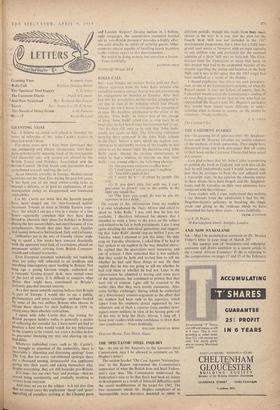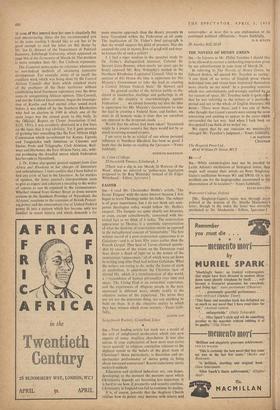AND NOW NYASALAND •
SIR,—May 1 be permitted to comment on Dr. Monica Fisher's letter in your issue of March 20?
1. She accuses you of 'inaccurate and unhelpful' comment and draWs attention to a recent article in the Central African Examiner. If she is referring to the compositions on pages 12 and 13 of the February 28 issue of that journal,then her case is singularly flat and unconvincing. Since she has recommended you to do some reading I should like to ask her to be good enough to read the letter on this theme by Mr. Ian G. Stewart of the Department of Political Economy, Edinburgh University, which appeared on page 964 of the Economist of March .14. The problem is more complex than Mr.: Pat Cochran represents.
The Examiner notes make no reference whatsoever to non-federal methods of advancing economic development. For example, many of us recall the excellent work which was being done by the Central African Council—that body which attacked many of the problems of the three territories without establishing lbeal European supremacy over the three areas Or antagonising African opinion. This Council, and nor the Federal Government, began the investiga- tion of Kariba and had started other sound .work before it was killed off by the Southern Rhodesians who had an election in 1949 in which one of the retain issues was the annual grant to this body. In the Officials' Report on Closer Association '(Cmd. 8233, 1951), it was cavalierly dismissed in a few lines on the basis that it was advisOry. Yet it gait promise Of growing into something like the East African High Commission which, co-ordinateg for Kenya, Uganda and Tanganyika' such functions as Customs and Excise, Posts and Telegraphs, Civil Aviation, Rail- ways and Harbours, the East African Navy, etc., with- out producing the dreadful unrest which Federation has brought to Nyasaland.
2. Dr. Fisher also quotes general support from East Africa and Rhodesia in her charges of inaccuracy and unhelpfulness. I must confess that I have failed to find any error of fact in the Spectator. As for matters of opinion, the latter journal's interpretations seem to give as cogent and coherent a meaning to the welter of reports as can be expected in the circumstances. Whether viewed from Gower Street or from mission stations• in the Southern Province of Nyasaland, the Africans' reactions to the recession of British Protect- ing power and the concomitant rise of United Federal power fit into a pattern which has become only too familiar in recent history and which demands a far
more creative approach than the dreary pressure to keep Nyasaland within the Federation at all costs. The implication of Dr. Fisher's final paragraph is that she would support this kind of pressure. Has she counted the cost in money,4oss of good will and may- be human life of such a policy?
3. I find a riper wisdom in the speeches made by Dr. Fisher's distinguished kinsman, Colonel Sir Stewart Gore-Browne, when nearly ten years ago he firmly opposed Mr. Roy Wele9sky's rnotipii in the Northern Rhodesian Legislative Council. 'that' in the opinion of this House the time is opportune for His Majesty's Government to take the lead in creating a Central African Federal State.' Sir Stewart said
. . the general verdict of the African public as dis- closed at numberless Meetings and gatherings in all parts of the country is overwhelmingly against Federation . . . we cannot honestly say that the time is opportune for His Majesty's Government• to take the lead in creating a Federal State, and further, we must in all honesty make it clear that we ourselves are opposed to the proposals, made. . .
Would that his advice had been taken! Nyasaland, might be a poorer country but there would not be so much mourning around corpSes.
I am sorry to be so critical of one whose personal influence in Northern Rhodesia has been so good. I hope that she keeps on reading the Spectator.Y ours faithfully:
23 Inverleith Terrace, Edinburgh, 3'
[There was .a slip in our March 20 'Portrait of the Week' when we referred to 'police-state legislation proposed by Sir Roy VVelensky' instead of Sir Edgar Whitehead.—Editor, Spectator.]



































 Previous page
Previous page